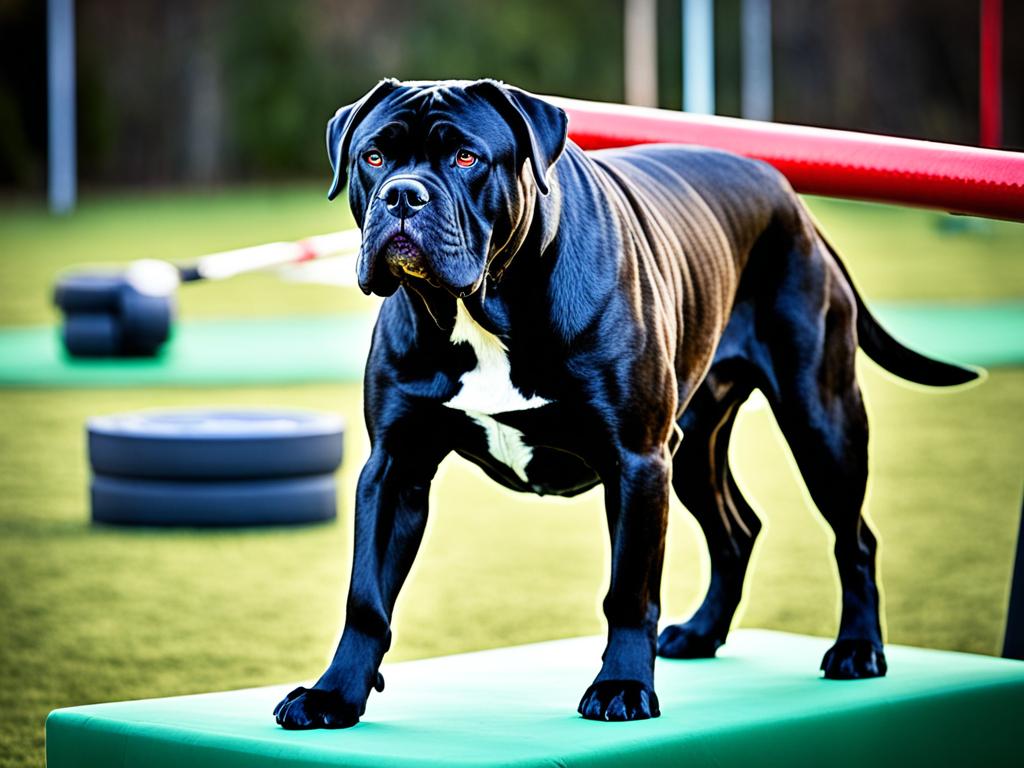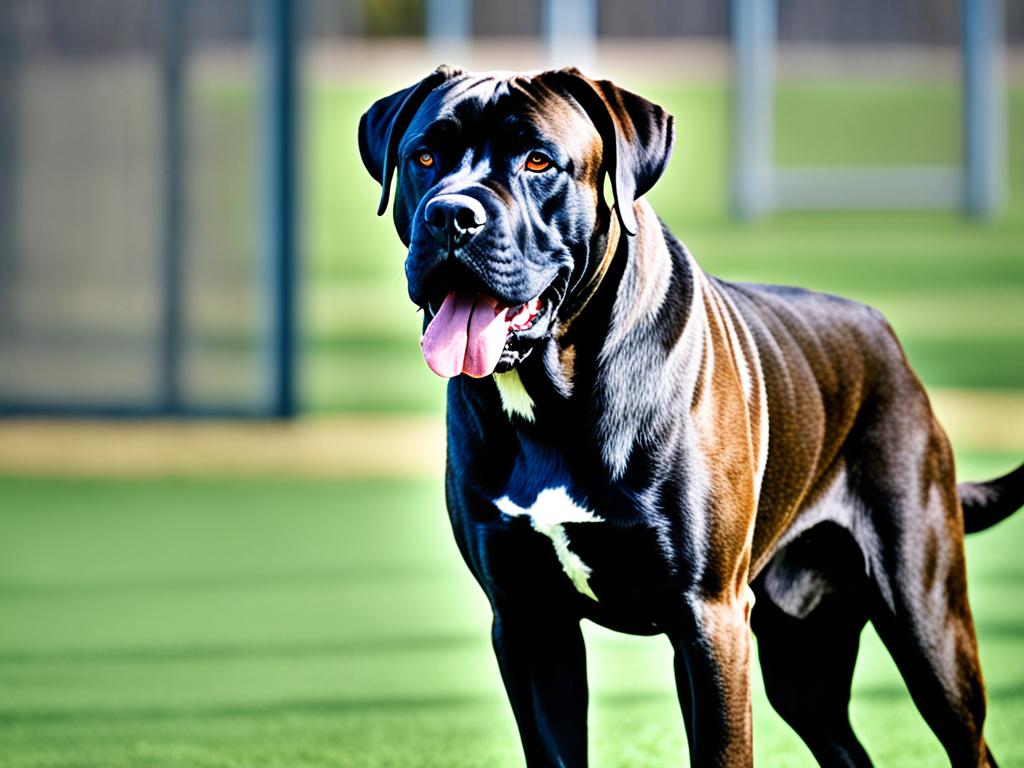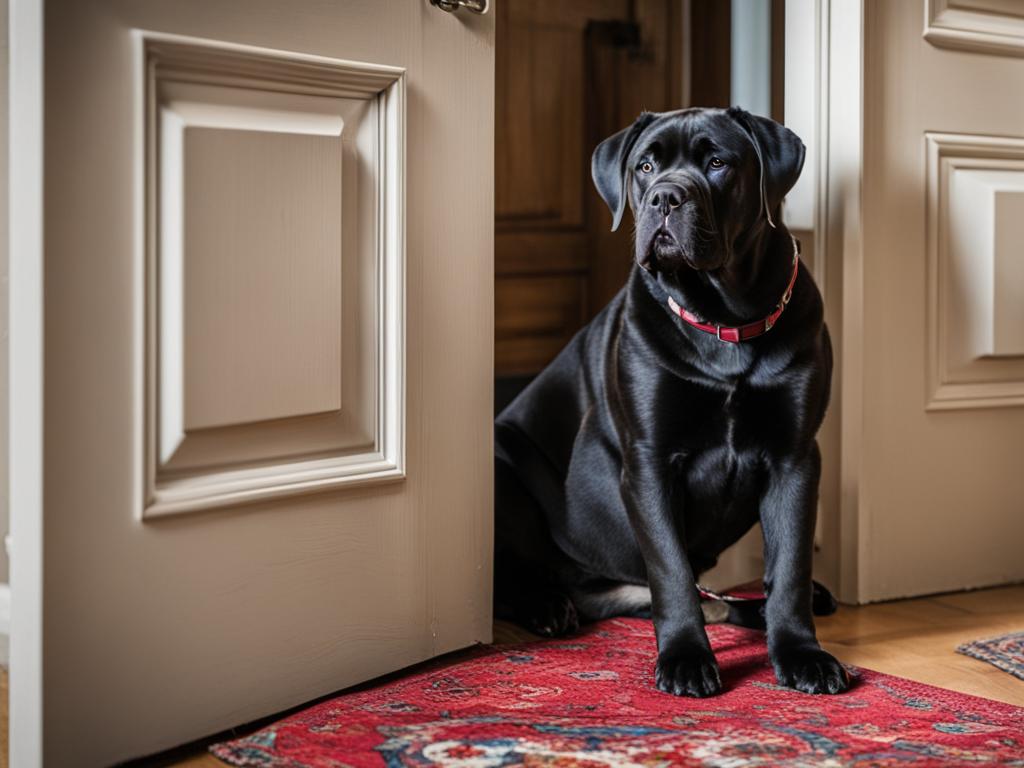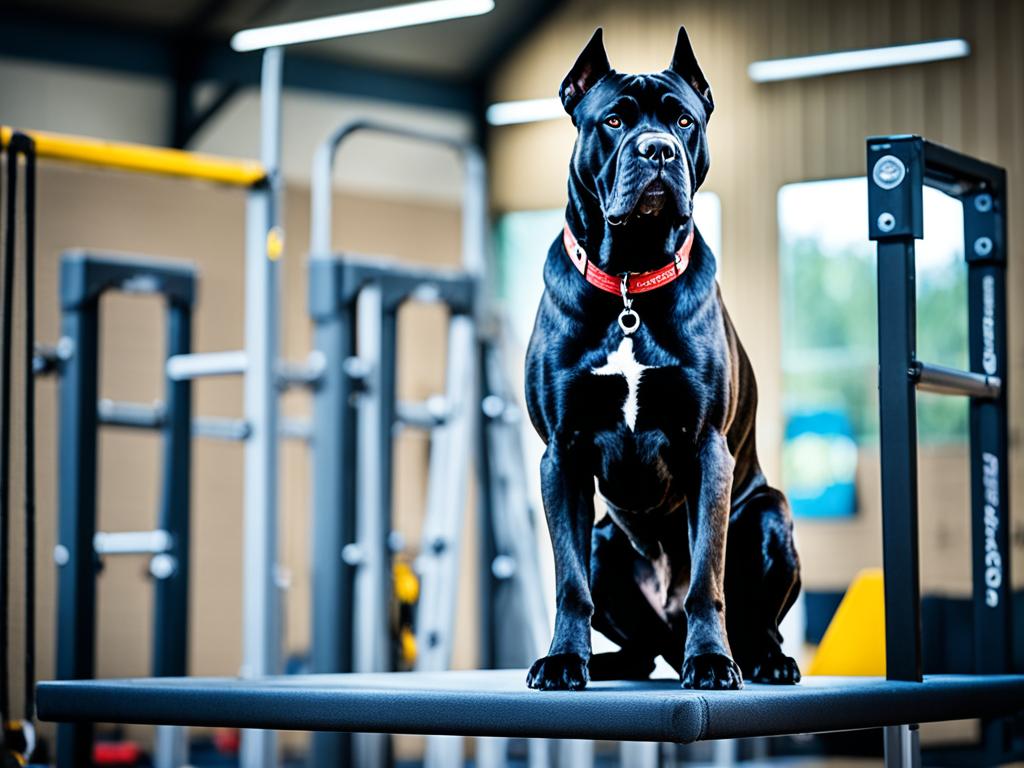Did you know that despite their imposing stature, Cane Corsos are known to encompass a sensitive streak that requires a unique blend of firmness and gentle guidance in training? These intelligent yet **training stubborn dogs** can present a remarkable challenge to even the most experienced dog owners. With their history as Italian guardians, Cane Corsos carry a legacy that demands respect and authority, leading to distinctive **Cane Corso training challenges**. By employing **effective dog training methods** and practical **behavior modification tips**, owners can form a harmonious bond with these vigilant giants, achieving profound results in **overcoming training hurdles**.
Here is a brief overview of what you can expect as you navigate the journey of training your Cane Corso:
Key Takeaways
- Understanding the Cane Corso’s sensitive yet stubborn nature is essential for effective training.
- Early socialization and consistent, positive **effective dog training methods** are key in managing this breed’s protective instincts.
- Persistence in utilizing **behavior modification tips** will pay off in mitigating dominant tendencies.
- A well-adjusted Cane Corso reflects the patience and determination invested in **training stubborn dogs**.
- Strategic approaches and professional insights are crucial in **overcoming training hurdles** with a Cane Corso.
- Creating a structured and nurturing environment is imperative for addressing the breed’s unique challenges.
Introducing the Majestic Cane Corso
The Cane Corso breed stands as a pinnacle of grace and vigilance, deeply rooted in Italian history. These dogs showcase a proud lineage that combines an unyielding guardian spirit with a touch of affection, unique to their character.
The Origin and Legacy of the Breed
Originating from Italy, the Cane Corso’s ancestry is steeped in a tradition of versatility and strength. Employed in ancient times for tasks ranging from property protection to assisting in hunts, the breed’s historical context underpins its modern-day reputation as the epitome of robust canine defenders.
Physical Characteristics and Protective Instincts
With its muscular physique, the Cane Corso exudes power and agility. These dogs are equipped with a substantial frame, often standing up to 28 inches at the shoulder, and have the capacity to weigh an imposing 120 pounds. Their imposing presence is complemented by a stiff, short coat which comes in a spectrum of colors from solemn black to vibrant fawn.
Beyond aesthetics, the Cane Corso’s solid guarding instincts are a testament to their heritage. Their self-assurance is matched by an affectionate temperament that reveals itself within the sanctuary of their family, making them not only watchful protectors but also cherished companions.
The Cane Corso is an impeccable blend of grandeur and devotion, a true guardian breed with a presence that commands respect and a heart that offers unwavering loyalty. Intelligent, trainable, and with an innate protective nature, they are stalwart guardians that, with the proper training and socialization, become irreplaceable members of the family.
Cane Corso Training Challenges
Training a Cane Corso can be a rewarding experience, but it also comes with its own set of canine training obstacles. These dogs are known for their assertive personality, which, if not directed properly, can manifest as overt aggression or disobedience. To ensure long-term success in solving behavioral issues, owners need to be well-versed in professional dog training techniques that cater to the Cane Corso’s unique temperament.
The primary solving behavioral issues revolve around the Cane Corso’s instinct for dominance, which can lead to authority challenges against their humans. Without correct intervention from puppyhood through socialization and disciplined training, these dogs may exhibit problematic behaviors including excessive aggression towards both strangers and other dogs.
- Early Socialization: Exposing your Cane Corso to diverse situations and environments is crucial for healthy behavioral development.
- Positive Reinforcement: This technique encourages good behavior by rewarding your dog, thus promoting a positive association with following commands.
- Correction Methods: When your Cane Corso displays undesirable behavior, timely and appropriate correction is essential.
Implementing a training regime, which includes early and consistent application of these strategies, is vital to overcoming the intrinsic challenges when raising and training a strong-willed breed like the Cane Corso. By doing so, owners can shape a well-behaved canine companion who is both a joy and a protector to their family.
Understanding Temperament and Social Needs
The Cane Corso’s distinguishing temperament of confidence and protectiveness demands an owner who is adept in establishing a leadership role that is both firm and consistent. To effectively manage and guide such a dominant breed, a deep understanding of professional dog training techniques is essential. The foundation of a successful training regimen lies in the trust between the dog and its owner, forged through consistent, clear communication and reinforced boundaries.
Socialization plays a pivotal role in shaping the temperament of a Cane Corso, which is why experts advocate for advanced dog obedience training to begin as early as possible. Properly socialized dogs are known to develop balanced temperaments, making them adaptable and well-behaved in various situations. Delaying or overlooking the importance of early socialization can lead to significant behavioral issues that are far more complex to rectify later in life.

Building Trust with a Dominant Breed
Earning the trust of a dominant canine like the Cane Corso is a critical step in any comprehensive training program. This process requires patience and coherence in technique, ensuring that the dog consistently receives the message that its owner is a dependable leader. Trust is not established overnight; it results from prolonged and consistent interactions that reinforce the owner’s role as the pack leader.
Importance of Early Socialization
Introducing a Cane Corso to a variety of environments, people, and other animals at a young age is imperative for cultivating a stable and social pet. Socialization influences how the dog reacts to new experiences and can drastically reduce the potential for fear-based defensive behaviors. It is through such well-planned and executed early socialization strategies that the Cane Corso can achieve its full potential as a companion and a protector.
Preventing and Managing Aggressive Behaviors
Efforts to cultivate a well-behaved Cane Corso should begin with an emphasis on understanding and influencing the dog’s behavior in a positive direction. Professional trainers and canine behaviorists often stress the importance of early and ongoing socialization to mitigate aggressive tendencies. Interventions grounded in behavior modification tips and strategies will prove to be invaluable for solving behavioral issues commonly experienced with this breed.
Socialization Strategies to Curb Aggression
Exposing your Cane Corso to a variety of people, places, and other animals is a fundamental strategy to decrease the likelihood of aggression. Socialization broadens your dog’s experiences, teaching them the appropriate way to react to new stimuli and reducing the impulse towards territorial aggression.
- Introduce your dog to new people and animals in a controlled environment.
- Enroll in a puppy socialization class where your dog can interact with others.
- Associate positive experiences with new encounters using treats and praise.
Recognizing Early Signs of Aggression
Becoming alert to the precursors of aggression can enable you to curtail negative behaviors before they escalate. Growling, snapping at the air, and a stiffening body posture often serve as advance warnings of a Cane Corso’s discomfort or propensity to act aggressively.

- Monitor your dog for these signs and interrupt any escalation with a distraction.
- Consult with a professional if you notice frequent aggressive responses.
- Keep a log of aggressive incidents to determine triggers and patterns.
Professional Training Techniques for Behavior Modification
Effective behavior modification techniques are rooted in reinforcing the behaviors you wish to encourage while eliminating the rewards for undesirable actions. It is essential to reject physical punishment, as it can intensify aggression and damage the bond of trust.
| Technique | Execution | Outcome |
|---|---|---|
| Positive Reinforcement | Provide treats or praise for calm, non-aggressive behavior. | Encourages the dog to repeat these desirable behaviors. |
| Redirection | Redirect aggressive behavior to a more acceptable action like sitting or lying down. | Changes the dog’s focus and diffuses the combative energy. |
| Time-Outs | Remove the dog from an exciting environment promptly after an aggressive display. | Teaches the dog that aggression leads to loss of social contact. |
Overall, a comprehensive approach to behavior modification, intertwining socialization, recognition of aggression signs, and adherence to professional training protocols, is the most effective pathway to solving behavioral issues within Cane Corsos. Thus, encouraging a harmonious relationship between dog and owner, and promoting a safer environment for both the canine and community.
Addressing Separation Anxiety in Cane Corsos
One of the challenging dog obedience problems particularly prevalent among Cane Corsos is separation anxiety. This condition often reveals itself through undesirable behaviors like excessive barking, destructive chewing, or even attempts to escape when the dog is left alone. Training stubborn dogs to overcome such hurdles requires a multifaceted approach that not only aims to reduce their anxiety but also encourages their independence.

To effectively address separation anxiety, consistent strategies and a nurturing environment must be established. An integral part of this process involves creating a secure space for the dog, such as a well-equipped crate, which serves as a safe haven during times of solitude. Additionally, introducing toys and puzzles can provide the mental stimulation necessary to distract and engage a Cane Corso’s active mind.
- Introduce a comfortable crate to foster a sense of security
- Incorporate interactive toys to reduce boredom and provide mental exercise
- Gradually increase the duration of periods spent alone to build tolerance
For successful outcomes in overcoming training hurdles, one should not overlook the importance of ample physical exercise and establishing a consistent routine. Such regimentation helps mitigate the intensity of separation anxiety by channeling the dog’s energy positively and providing a predictable structure to their day.
The structured approach not only curtails the manifestation of separation anxiety but lays the foundation for a well-adjusted, obedient, and content Cane Corso.
Advanced Dog Obedience Training
As we push the boundaries of basic canine commands, advanced dog obedience training steps into the forefront, fostering a new level of understanding between owner and pet. Emphasizing more nuanced commands, this training phase not only contributes to a dog’s well-being but also ensures their safety in various environments. The goal is to build upon a solid foundation of obedience, propelling both the owner and the canine into a harmonious relationship guided by mutual respect and clarity of communication.
Moving Beyond Basic Commands
Advanced dog obedience training is not merely an extension of rudimentary skills; it encompasses an array of techniques designed to enhance a dog’s capability to follow commands such as “heel,” “place,” and “leave it.” These essential cues ensure your dog can navigate complex situations with ease. The depth of training delves into improving leash manners, instructing proper greeting etiquette, and ensuring reliable recall—skills that profoundly affect both the dog’s social interactions and safety.
Utilizing Positive Reinforcement Effectively
In advanced obedience training, the effective dog training methods revolve around reinforcing desirable behavior with incentives. Positive reinforcement employs praise, treats, and playtime to encourage and reward your dog for each successful execution of a command. This approach nurtures a positive learning atmosphere and fortifies the bond between you and your canine companion. Aligning with the American Veterinary Society of Animal Behavior’s recommendations, these ethical training methods stand as pillars of a humane and productive training regimen.
Solving Behavioral Issues with Consistency
Tackling the complexities of canine training obstacles, especially those presented by the Cane Corso breed, requires a dynamic and unwavering approach to conditioning and instruction. The manifestation of solving behavioral issues within this intelligent yet assertive breed lies in the subtle art of implementing steadfast consistency and coherence in their everyday routine.
Establishing Clear Rules and Boundaries
Clear rules and boundaries form the backbone of any successful dog training regimen. For the Cane Corso, whose robust character can lead them down a path of dominance and territorial behavior, these guardrails are non-negotiable. The implementation of such rules is not just about asserting authority, but also about guiding your Cane Corso to understand their role and place within the family unit, creating a harmonious household.
Creating a Structured Routine
Consistent routines serve as the framework for a Cane Corso’s balanced lifestyle, thereby overcoming canine training obstacles that compromise both the dog’s and the owner’s quality of life. A structured daily schedule that includes designated times for meals, walks, play, rest, and training sessions can have a profound effect on reducing a pet’s stress and curbing anxiety-driven behaviors.
- Regular exercise to manage energy levels and maintain mental stimulation
- Consistent command reinforcement to enhance obedience
- Set meal times to establish food-related behaviors
- Designated quiet times to foster calmness and reduce anxiety
Embracing these methodologies with consistency propels the Cane Corso towards a well-adjusted temperament, cementing the owner’s role not just as a caretaker but as a respected leader. The breed thrives under structured guidance, and this in turn forges a stronger, more responsive bond between owner and dog, ultimately leading to a more manageable and gratified life for both.
Training Stubborn Dogs: Patience is Key
When faced with the challenge of training stubborn dogs, one of the most significant virtues an owner can possess is patience. The Cane Corso, with its strong-willed and assertive demeanor, may not instantly adhere to commands, which can test the resilience of any trainer. Addressing this trait requires a nuanced approach, drawing on a broad spectrum of behavior modification tips tailored to the dog’s independent nature. Overcoming these training hurdles does not happen overnight and dedication to the process is paramount.
The following strategies have proven to be effective in training recalcitrant canines such as the Cane Corso:
- Consistency in training sessions, ensuring that the dog receives a reliable and structured learning experience.
- Positive reinforcement, rewarding good behavior with treats or praise to build better habits.
- Identifying and understanding the individual dog’s motivators to tailor the training effectively.
- Establishing a strong leader-dog relationship where the dog sees the owner as the pack leader.
- Patiently repeating commands and tasks until they are mastered, despite initial resistance.
It is essential to remember that each Cane Corso has a distinct personality and may require different techniques for optimal training outcomes. Some may respond better to extra playtime as a reward rather than food incentives, for example.
Beyond individual sessions, integrating training into daily routines allows these dogs to understand that expectations extend beyond training time. This alignment of daily life with training creates an environment conducive to learning and upholds a standard of behavior that the breed can adhere to naturally.
For continuing progress, it is also important to keep overcoming training hurdles with professional guidance when necessary. Trainers who specialize in breeds like the Cane Corso can offer invaluable advice and support, enhancing the owner’s efforts to shape their dog’s behavior.
Ultimately, when training stubborn dogs like the Cane Corso, patience is not just a virtue but a necessity. This deep understanding fosters a robust bond and mutual respect, resulting in a well-trained and happy dog.
Physical Exercise: A Cornerstone of Cane Corso Training
For the powerful and dynamic Cane Corso, physical exercise is not just a leisure activity; it is an integral component of their overall wellbeing. Both a deterrent for stress and a remedy for anxiety, exercise plays a critical role in the daily regimen of these dogs. By incorporating a structured exercise routine, owners can effectively confront canine training obstacles, paving the way to overcoming training hurdles that might otherwise seem insurmountable. It is through these disciplined practices that the foundations for solving behavioral issues begin to solidify.
The Role of Exercise in Mitigating Stress and Anxiety
Stress and anxiety can manifest in disruptive ways, particularly in a breed with the intense energy levels of the Cane Corso. Regular walking, jogging, or even agility training serves a dual purpose—channeling the breed’s innate stamina while also acting as a pressure valve for built-up stress. This results in a calmer, more contented dog, less prone to the common stress-induced behaviors that can plague dogs of this stature. By tackling exercise head-on, owners take an active role in helping their Cane Corsos lead more harmonious lives.
Exercise and Mental Stimulation: A Balanced Approach
The Cane Corso thrives on a balance between physical exertion and cognitive challenges. Mental stimulation is just as important as physical activity in keeping this intelligent breed engaged and at ease. Tools such as interactive toys and complex problem-solving games complement the physical aspect of their training, ensuring that both mind and body are attended to. It’s this holistic approach to exercise and mental engagement that resolves potential behavioral issues, creating a well-adjusted canine companion adept at navigating the intricacies of their human-inhabited world.
FAQ
What are common Cane Corso training challenges and how can they be addressed?
Common challenges include the breed’s stubbornness, dominance, and potential for aggression. Addressing these requires a combination of behavior modification tips, effective dog training methods, early socialization, and patience to overcome training hurdles characteristic of the breed.
What is essential to know about the Cane Corso’s origin and physical characteristics?
Understanding the breed’s guarding instincts, muscular physique, and affectionate temperament helps tailor the approach to training and socialization.
How can I effectively build trust with my dominant Cane Corso during training?
Establish yourself as a firm, consistent leader, utilize professional dog training techniques, and engage in advanced dog obedience training to build a strong foundation of trust and respect.
What are the best strategies to prevent and manage aggressive behaviors in Cane Corsos?
Employ socialization strategies to introduce your pet to different stimuli, be vigilant to early signs of aggression, and apply professional training techniques for behavior modification without resorting to physical punishment.
How can I help my Cane Corso cope with separation anxiety?
Mitigate separation anxiety by creating a secure space for your dog, providing mental stimuli, and gradually increasing time spent alone while ensuring a consistent routine and ample exercise to manage any related dog obedience problems.
What constitutes advanced dog obedience training for a Cane Corso?
It includes teaching complex commands and enhancing responsiveness using positive reinforcement effectively, going beyond basic commands to ensure the safety of your dog in various situations.
What methods are effective in establishing clear rules and a structured routine for my Cane Corso?
Consistency is vital. Maintain a routine that includes regular exercise and training sessions, enforce rules regularly, and offer clear boundaries to navigate the canine training obstacles efficiently.
What should I keep in mind when training a stubborn Cane Corso?
Patience is critical when facing the challenges of training a strong-willed breed. Consistent, positive training methods tailored to the dog’s intelligence and disposition help in overcoming training hurdles.
How crucial is physical exercise in training my Cane Corso, and what should the exercise regimen include?
Physical exercise is essential in managing stress, anxiety, and high energy levels. Incorporate regular walking, jogging, agility training, and mental stimulation exercises into your Cane Corso’s regimen to ensure well-rounded development and behavior management.

Leave a Reply